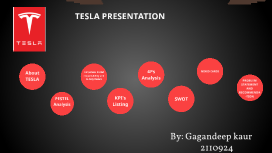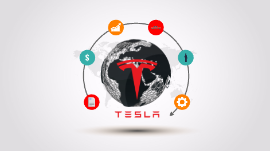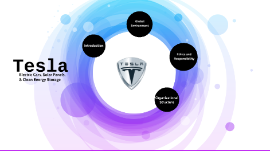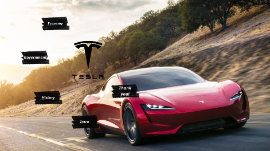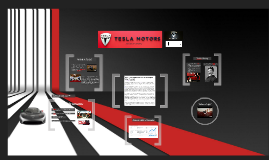Tesla Presentation
Transcript: Company History 1 - 2003, Tesla Motors Inc. founded - 2004, Elon Musk become Chairman Founding of Tesla Motors - 2007, Eberhard resigns - 2008, Tesla Roadster released - 2008, Tarpenning resigns - 2008, Elon Musk is now CEO First Product - 2010, Tesla Motors goes public - 2012, Model S becomes priority - 2012, Tesla Stations Changes in the Company - 2014, auto-pilot implementation - 2015, Model X -2015, Product diversification Building Excitement - 2016, controversial acquisition - 2017, name change - 2017, Model 3 - 2018, SEC lawsuit - 2018, Profitable year Peaks and Valleys at Tesla - 2016, SolarCity - 2017, Perbix and Grohmann Engineering Mergers and Acquisitions Elon Musk - CEO $ February 2004 - Becomes Chairman of the Board October 2008 - Becomes CEO of Tesla November 2013 - Named Fortune's Businessperson of the Year June 2017 - Featured on Fortune 500 list of the nation's largest companies March 2018 - Net worth is estimated at $19.9 billion by Forbes $56,160 CFO Deepak Ahuja - CFO Materials engineering degree Bachelor's: Banaras Hindu University Master's: Northwestern University MBA: Carnegie Mellon University Previous titles CFO for Auto Alliance International CFO for Ford of Southern Africa Has experience in many aspects of business: Manufacturing, Marketing and Sales, Treasury, Acquisition and Divestitures 2008-2015: Served as Tesla’s CFO February 2017: Returned to Tesla as CFO $500,000 CTO Jeffrey B. Straubel - CTO Degrees Bachelor's in energy systems engineering Master's degree in engineering Received both from Stanford University Co-founder of Tesla Managed the engineering and technical design of the automobiles Holds 326,301 shares of Tesla Second-largest individual shareholder $249,600 Stock Analysis Q1 Q2 Q3 PROFIT 2010-2013 2010-2013 2010 IPO 2012 Model S 2015-2017 2015-2017 2015 Model X 2016 Election 2016 Model 3 2018 2018 Tweets SEC investigation Settlement Hold Tesla-High risk General Motors-Medium risk As of October 6th General Motors vs Tesla General Motors vs Tesla The 2018 Tesla Model 3 Range: 220 miles Charging: Tesla’s Vast Supercharging Network Safety: IIHS Superior Rating/ 5-star NHTSA safety rating. Performance: 0-60 mph in 5.6 seconds / Max Speed: 125 mph Display: 15 inch touch screen Collision Warning: Front-end collision warning Regenerative braking: Yes Passengers: 5 adults Auto-pilot: Update coming soon Price: Currently $45k, price varies - The Tesla Model 3 combines efficiency with luxury at an affordable price. - 5-star NHTSA safety rating. - The Model 3 represents the upcoming future of the automotive industry. Strengths S https://www.google.com/url?sa=i&rct=j&q=&esrc=s&source=images&cd=&cad=rja&uact=8&ved=2ahUKEwiDioCd6dbeAhXp5IMKHc97DVYQjRx6BAgBEAU&url=https%3A%2F%2Fwww.yourcentralvalley.com%2Fnews%2Ftesla-opens-newest-supercharger-station-in-kettleman-city%2F858378468&psig=AOvVaw1Wz3gODgtYlpHFh8eVdEcs&ust=1542385765352383 - Tesla CEO, Elon Musk, originally promised that the Model 3 would sell for $35k per car. As of mid October, the Model 3 runs at about $45k per car. - Due to conflict between Musk, the company board, and the SEC, Tesla has been on the hot seat recently. Weaknesses W - The Model 3 presents Tesla with the opportunity to dominate in popularity in comparison to other electric vehicles. - The release of the 2018 Model 3 helped Tesla recently secure a profit. - Investing in a Model 3 is an wise long term decision. Renewable energy decreases costs. Opportunities O - Within the past year, Tesla investors have been unhappy with the actions brought on by Musk and other company board members. - Some investors are skeptical of what Tesla can actually produce. Threats T Customer Employee Investor Hibbard, J. (2006). Hey, Detroit, Wanna Drag? BusinessWeek, (3983), 70–72. Retrieved from http://libproxy.lib.ilstu.edu/login?url=https://search.ebscohost.com/login.aspx?direct=true&db=bth&AN=20638951&site=ehost-live&scope=site Moresco, J. (2009). Tesla Roadster Gets Faster, More Pricey. Red Herring, 3. Retrieved from http://libproxy.lib.ilstu.edu/login?url=https://search.ebscohost.com/login.aspx?direct=true&db=bth&AN=36602885&site=ehost-live&scope=site DEAGON, B. (2018, October 5). Can Tesla, Musk Turn Model 3 Into A Company Profit Driver? Investors Business Daily, p. N.PAG. Retrieved from http://libproxy.lib.ilstu.edu/login?url=https://search.ebscohost.com/login.aspx?direct=true&db=bth&AN=132178158&site=ehost-live&scope=site Nelson, G.S., (2018, October 6). Stock Report. 1-9. Retrieved from https://www.capitaliq.com/CIQDotNet/my/dashboard.aspx Heinzman Jr., J., Torres, R., & Quenneville, T. (2018). Tesla’s Supply Chain and Operations: A Case Study. IABS Journal, 1(3), 10–37. Retrieved from http://libproxy.lib.ilstu.edu/login?url=https://search.ebscohost.com/login.aspx?direct=true&db=bth&AN=131274390&site=ehost-live&scope=site Snider, M. (2018, October 11). A victory for Elon Musk: Tesla outsells Mercedes-Benz in US for first time ever. USA Today. Retrieved







